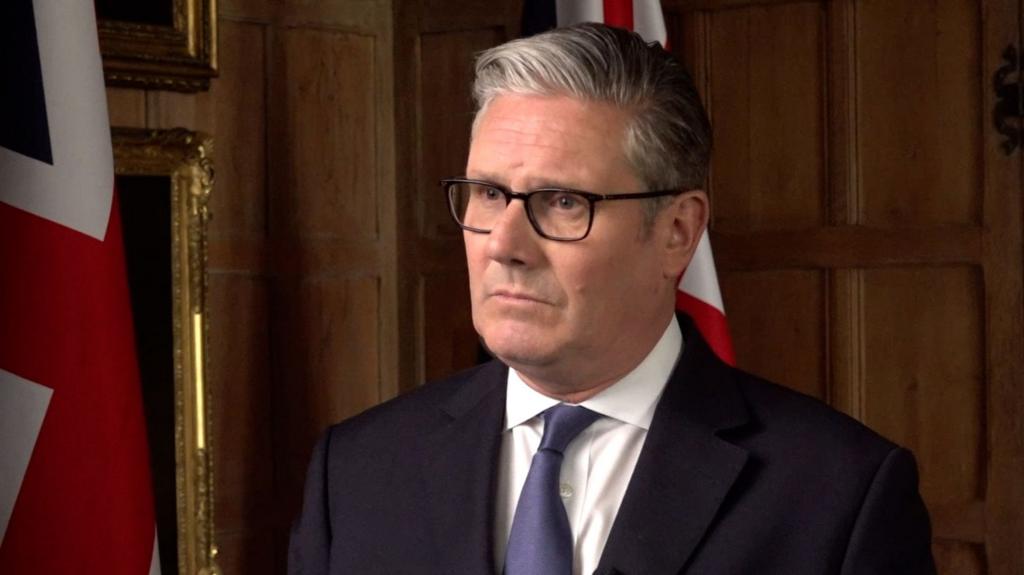Keir Starmer, Leader of the Opposition, has voiced concerns about potential escalation in the Middle East and beyond following overnight US airstrikes on Iranian nuclear facilities.
The Prime Minister reassured the British public, emphasizing the government’s commitment to stabilizing the situation and pursuing a diplomatic resolution after the US attacks on three Iranian sites.
He confirmed that the government has implemented necessary measures to safeguard UK interests in the region, prioritizing de-escalation efforts.
Starmer clarified that the UK was not involved in the US operation but was informed beforehand. He chaired an emergency Cobra meeting and engaged in discussions with global leaders.
The US military conducted strikes on three Iranian nuclear facilities: Natanz, Isfahan, and Fordo. US Defence Secretary Pete Hegseth described the strikes as devastating to Iran’s nuclear program.
Iranian Foreign Minister Seyed Abbas Araghchi condemned the strikes as outrageous, predicting lasting consequences.
Speaking from Chequers, Starmer highlighted the risk of regional and international escalation, underscoring the need for renewed negotiations to address the nuclear threat.
He reiterated the UK’s stance against Iran acquiring nuclear weapons, emphasizing regional stability as a top priority.
Business Secretary Jonathan Reynolds highlighted the tangible threat posed by Iran to the UK, asserting that a responsible government would prevent Iran from possessing nuclear weapons.
This statement follows an October report by MI5 detailing 20 Iranian-backed plots in the UK since 2022, posing significant threats to British citizens.
Ken McCallum’s statement described an unprecedented scale and pace of these plots.
While preferring a peaceful resolution, Reynolds acknowledged Iran’s disregard for diplomatic efforts, characterizing it as a mistake.
Follow latest developments: US strikes on Iranian nuclear sites.
Further details on the US strikes on Iran’s nuclear facilities.
The Prime Minister stated that the UK has repositioned assets in the region to protect its interests and those of its allies.
A UK defence source confirmed that British military personnel in the Middle East are now on high alert.
Just a week prior, Starmer met with President Trump at the G7 summit, advocating for de-escalation. At that time, there were no indications of imminent US military action.
Iran maintains that its nuclear ambitions are peaceful, characterizing recent uranium enrichment as research and development.
However, the IAEA’s report raised concerns, indicating Iran possesses enough enriched uranium for several nuclear weapons.
Iran’s ambassador to the UK, Seyed Ali Mousavi, denied any intention of military aggression and stated Iran is assessing its response to the US actions.
Israeli President Isaac Herzog confirmed substantial damage to Iran’s nuclear program but lacked prior knowledge of the US operation.
Recent cross-border attacks between Israel and Iran preceded the US strikes.
B-2 stealth bombers deployed from a US airbase in Missouri to Guam prior to the strikes; the UK-US base on Diego Garcia was not utilized.
President Trump declared the operation a military success, warning Iran of even greater attacks if peace is not pursued.
The IAEA reports no increase in off-site radiation following the strikes.
UN Secretary-General António Guterres called the strikes a dangerous escalation.
Conservative leader Kemi Badenoch supported the US action, while Liberal Democrat leader Ed Davey called for de-escalation and a diplomatic solution.
Starmer’s previous calls for negotiations.
Foreign Secretary David Lammy recently met with US officials, discussing diplomatic avenues for conflict resolution.
The FCDO advises against travel to Israel, the Occupied Palestinian Territories, and Iran, and has arranged a repatriation flight for British nationals from Tel Aviv.
British Airways temporarily suspended flights to Dubai and Doha.
Analysis of the US strikes in Iran by BBC’s Joe Inwood.
BBC’s Jo Floto assesses the potential for further escalation in the Middle East.
Potential consequences for President Trump, including potential internal dissent and retaliatory measures.
President Trump’s televised warning to Iran.

